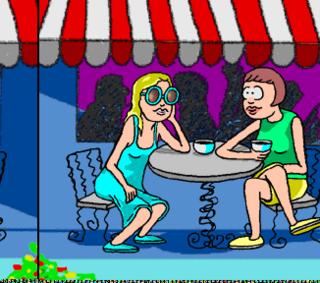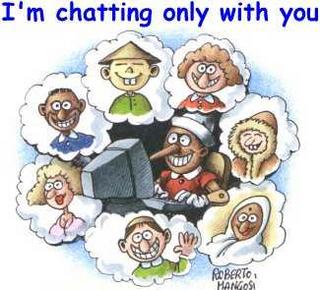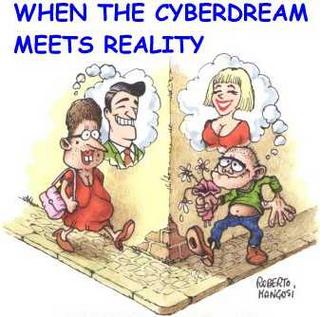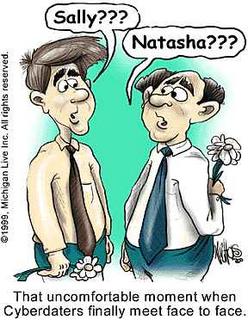9/25/2005
The missing face of the other in the online world
What would Levinas think of virtual worlds like Orkut and msn? When he died in 1995 these virtual worlds were clearly not that far developed yet, and Levinas was from an old mostly non-digital generation then. I spoke about this with my father and he said I should write about it in my dissertation. But first I will write about it here to start with.
 So how's the "meeting with the other", is it different in an online world than the offline world? Levinas always speaks about being "face to face with the other". In the virtual world I don't see the face of the other so directly in front of me. We can use webcams, but still I only see an image of the face of the other, not a "naked" face which is physically present in front of me. What is the effect of the absence of the face of the other? I think that the risk of totalisation / objectification of the other, of killing the other as a human, becomes bigger. It happens a lot at Orkut, that people call each other trolls or morons and that they tell each other to go to hell. It's easy to write posts full of hate and personal attacks, to say these things in front of somebody's face is much more risky, because there's a big chance of being beaten down. You type something and you send it, and then you will see what kind of reaction you will get, the interaction is less directly. Some Orkuters have animals or cartoon figures instead of their own faces as pictures in their profiles, and anonymous names. So it can happen easily that you forget that they are human in fact. And once the atmosphere became one of fighting it is hard to stop it, once people dehumanized each other, it's hard to undo it.
So how's the "meeting with the other", is it different in an online world than the offline world? Levinas always speaks about being "face to face with the other". In the virtual world I don't see the face of the other so directly in front of me. We can use webcams, but still I only see an image of the face of the other, not a "naked" face which is physically present in front of me. What is the effect of the absence of the face of the other? I think that the risk of totalisation / objectification of the other, of killing the other as a human, becomes bigger. It happens a lot at Orkut, that people call each other trolls or morons and that they tell each other to go to hell. It's easy to write posts full of hate and personal attacks, to say these things in front of somebody's face is much more risky, because there's a big chance of being beaten down. You type something and you send it, and then you will see what kind of reaction you will get, the interaction is less directly. Some Orkuters have animals or cartoon figures instead of their own faces as pictures in their profiles, and anonymous names. So it can happen easily that you forget that they are human in fact. And once the atmosphere became one of fighting it is hard to stop it, once people dehumanized each other, it's hard to undo it.
 It's also that Orkut is a truly multicultural society, so many cultures mixed in communities you won't find in any country. Americans form a minority in the American Politics community, the whole world discusses their politics with them. Orkut is a real global village and if you don't like that you shouldn't move around there, the fundamental cultural pluriformity cannot be avoided. But it is strange that the virtual world is not physical, it's not based in a particular country. If I would travel to the Middle-East I would carry decent clothes with me which are not too reveiling. But in the virtual world I think that I should be able to travel around in the same way as I behave in the Netherlands, otherwise I don't know to which culture I should adapt my behaviour, that would be strange in the online world. But still my behaviour can be as shocking for people with other cultural backgrounds as when I would behave like that in their country. If there is one place where intercultural compentences are needed, like respect and openness to other cultures, patience, empathy, to listen well to what others say, then it's in the online Orkut world. But people often don't realise that.
It's also that Orkut is a truly multicultural society, so many cultures mixed in communities you won't find in any country. Americans form a minority in the American Politics community, the whole world discusses their politics with them. Orkut is a real global village and if you don't like that you shouldn't move around there, the fundamental cultural pluriformity cannot be avoided. But it is strange that the virtual world is not physical, it's not based in a particular country. If I would travel to the Middle-East I would carry decent clothes with me which are not too reveiling. But in the virtual world I think that I should be able to travel around in the same way as I behave in the Netherlands, otherwise I don't know to which culture I should adapt my behaviour, that would be strange in the online world. But still my behaviour can be as shocking for people with other cultural backgrounds as when I would behave like that in their country. If there is one place where intercultural compentences are needed, like respect and openness to other cultures, patience, empathy, to listen well to what others say, then it's in the online Orkut world. But people often don't realise that.
 But there are also positive aspects of these virtual worlds. For me personally, for instance, an advantage is that I am not shy in an online world. I don't know what it is that makes that I can write much better than speak, words just don't want to go out of my mouth, probably it's exactly the power of the face of the other in front me that makes it more difficult for me to express my thouhgts. MSN is like telephatics for me. I think something and I send it through MSN, and I receive the thoughts of my friend in reply. Research has shown that teenagers are often seriously bullied by their class mates in MSN (you wonder then why the victims don't block the bulliers in MSN). So that's the same effect as in Orkut, that you can easily insult people because they can't hurt you physically and you don't see their face that requests of you that you stop the violence. But because it is more easy for me to tell others what I think in MSN, it's also more easy to give the other compliments and to say that the friendship is really important for me. Personally I like it very much that I find it much easier to express philosophical ideas. In the offline world it's very rarely that I succeed in that, only with really good listeners. When I can reread what I wrote before and when it's no problem when there are long silences, I can explain to others much better what I mean than when I talk to them.
But there are also positive aspects of these virtual worlds. For me personally, for instance, an advantage is that I am not shy in an online world. I don't know what it is that makes that I can write much better than speak, words just don't want to go out of my mouth, probably it's exactly the power of the face of the other in front me that makes it more difficult for me to express my thouhgts. MSN is like telephatics for me. I think something and I send it through MSN, and I receive the thoughts of my friend in reply. Research has shown that teenagers are often seriously bullied by their class mates in MSN (you wonder then why the victims don't block the bulliers in MSN). So that's the same effect as in Orkut, that you can easily insult people because they can't hurt you physically and you don't see their face that requests of you that you stop the violence. But because it is more easy for me to tell others what I think in MSN, it's also more easy to give the other compliments and to say that the friendship is really important for me. Personally I like it very much that I find it much easier to express philosophical ideas. In the offline world it's very rarely that I succeed in that, only with really good listeners. When I can reread what I wrote before and when it's no problem when there are long silences, I can explain to others much better what I mean than when I talk to them.
 And despite the fact that there are many inctercultural fights, I think that the strong interaction between different cultures in the online world could in the long run lead to that Orkuters know more about each others cultures and that they somehow start to respect people with other cultures and religions more. As I said before, the communities have a great internal cultural diversity. Cultural groups don't live next to each other without meeting each other, as it is often the case in multicultural societies. New friendships arise between people at opposite sides of the world. The fact that there are so many intercultural dialogues taking place at Orkut and in MSN, means at least that intercultural skills are practiced all the time and that Orkuters will probably and hopefully learn from the mistakes they make.
And despite the fact that there are many inctercultural fights, I think that the strong interaction between different cultures in the online world could in the long run lead to that Orkuters know more about each others cultures and that they somehow start to respect people with other cultures and religions more. As I said before, the communities have a great internal cultural diversity. Cultural groups don't live next to each other without meeting each other, as it is often the case in multicultural societies. New friendships arise between people at opposite sides of the world. The fact that there are so many intercultural dialogues taking place at Orkut and in MSN, means at least that intercultural skills are practiced all the time and that Orkuters will probably and hopefully learn from the mistakes they make.
So despite that Levinas would probably think that it's a matter of making ends meet in Orkut - that the situation to create ethical relations isn't optimal, because the face of the other is absent, I still think that in the effects of intercultural communication in virtual surroundings could be positive with regard to taking away prejudices and decreasing simplistic generalisations, discrimination, xenofobia and finally racism.
 So how's the "meeting with the other", is it different in an online world than the offline world? Levinas always speaks about being "face to face with the other". In the virtual world I don't see the face of the other so directly in front of me. We can use webcams, but still I only see an image of the face of the other, not a "naked" face which is physically present in front of me. What is the effect of the absence of the face of the other? I think that the risk of totalisation / objectification of the other, of killing the other as a human, becomes bigger. It happens a lot at Orkut, that people call each other trolls or morons and that they tell each other to go to hell. It's easy to write posts full of hate and personal attacks, to say these things in front of somebody's face is much more risky, because there's a big chance of being beaten down. You type something and you send it, and then you will see what kind of reaction you will get, the interaction is less directly. Some Orkuters have animals or cartoon figures instead of their own faces as pictures in their profiles, and anonymous names. So it can happen easily that you forget that they are human in fact. And once the atmosphere became one of fighting it is hard to stop it, once people dehumanized each other, it's hard to undo it.
So how's the "meeting with the other", is it different in an online world than the offline world? Levinas always speaks about being "face to face with the other". In the virtual world I don't see the face of the other so directly in front of me. We can use webcams, but still I only see an image of the face of the other, not a "naked" face which is physically present in front of me. What is the effect of the absence of the face of the other? I think that the risk of totalisation / objectification of the other, of killing the other as a human, becomes bigger. It happens a lot at Orkut, that people call each other trolls or morons and that they tell each other to go to hell. It's easy to write posts full of hate and personal attacks, to say these things in front of somebody's face is much more risky, because there's a big chance of being beaten down. You type something and you send it, and then you will see what kind of reaction you will get, the interaction is less directly. Some Orkuters have animals or cartoon figures instead of their own faces as pictures in their profiles, and anonymous names. So it can happen easily that you forget that they are human in fact. And once the atmosphere became one of fighting it is hard to stop it, once people dehumanized each other, it's hard to undo it. It's also that Orkut is a truly multicultural society, so many cultures mixed in communities you won't find in any country. Americans form a minority in the American Politics community, the whole world discusses their politics with them. Orkut is a real global village and if you don't like that you shouldn't move around there, the fundamental cultural pluriformity cannot be avoided. But it is strange that the virtual world is not physical, it's not based in a particular country. If I would travel to the Middle-East I would carry decent clothes with me which are not too reveiling. But in the virtual world I think that I should be able to travel around in the same way as I behave in the Netherlands, otherwise I don't know to which culture I should adapt my behaviour, that would be strange in the online world. But still my behaviour can be as shocking for people with other cultural backgrounds as when I would behave like that in their country. If there is one place where intercultural compentences are needed, like respect and openness to other cultures, patience, empathy, to listen well to what others say, then it's in the online Orkut world. But people often don't realise that.
It's also that Orkut is a truly multicultural society, so many cultures mixed in communities you won't find in any country. Americans form a minority in the American Politics community, the whole world discusses their politics with them. Orkut is a real global village and if you don't like that you shouldn't move around there, the fundamental cultural pluriformity cannot be avoided. But it is strange that the virtual world is not physical, it's not based in a particular country. If I would travel to the Middle-East I would carry decent clothes with me which are not too reveiling. But in the virtual world I think that I should be able to travel around in the same way as I behave in the Netherlands, otherwise I don't know to which culture I should adapt my behaviour, that would be strange in the online world. But still my behaviour can be as shocking for people with other cultural backgrounds as when I would behave like that in their country. If there is one place where intercultural compentences are needed, like respect and openness to other cultures, patience, empathy, to listen well to what others say, then it's in the online Orkut world. But people often don't realise that.  But there are also positive aspects of these virtual worlds. For me personally, for instance, an advantage is that I am not shy in an online world. I don't know what it is that makes that I can write much better than speak, words just don't want to go out of my mouth, probably it's exactly the power of the face of the other in front me that makes it more difficult for me to express my thouhgts. MSN is like telephatics for me. I think something and I send it through MSN, and I receive the thoughts of my friend in reply. Research has shown that teenagers are often seriously bullied by their class mates in MSN (you wonder then why the victims don't block the bulliers in MSN). So that's the same effect as in Orkut, that you can easily insult people because they can't hurt you physically and you don't see their face that requests of you that you stop the violence. But because it is more easy for me to tell others what I think in MSN, it's also more easy to give the other compliments and to say that the friendship is really important for me. Personally I like it very much that I find it much easier to express philosophical ideas. In the offline world it's very rarely that I succeed in that, only with really good listeners. When I can reread what I wrote before and when it's no problem when there are long silences, I can explain to others much better what I mean than when I talk to them.
But there are also positive aspects of these virtual worlds. For me personally, for instance, an advantage is that I am not shy in an online world. I don't know what it is that makes that I can write much better than speak, words just don't want to go out of my mouth, probably it's exactly the power of the face of the other in front me that makes it more difficult for me to express my thouhgts. MSN is like telephatics for me. I think something and I send it through MSN, and I receive the thoughts of my friend in reply. Research has shown that teenagers are often seriously bullied by their class mates in MSN (you wonder then why the victims don't block the bulliers in MSN). So that's the same effect as in Orkut, that you can easily insult people because they can't hurt you physically and you don't see their face that requests of you that you stop the violence. But because it is more easy for me to tell others what I think in MSN, it's also more easy to give the other compliments and to say that the friendship is really important for me. Personally I like it very much that I find it much easier to express philosophical ideas. In the offline world it's very rarely that I succeed in that, only with really good listeners. When I can reread what I wrote before and when it's no problem when there are long silences, I can explain to others much better what I mean than when I talk to them. And despite the fact that there are many inctercultural fights, I think that the strong interaction between different cultures in the online world could in the long run lead to that Orkuters know more about each others cultures and that they somehow start to respect people with other cultures and religions more. As I said before, the communities have a great internal cultural diversity. Cultural groups don't live next to each other without meeting each other, as it is often the case in multicultural societies. New friendships arise between people at opposite sides of the world. The fact that there are so many intercultural dialogues taking place at Orkut and in MSN, means at least that intercultural skills are practiced all the time and that Orkuters will probably and hopefully learn from the mistakes they make.
And despite the fact that there are many inctercultural fights, I think that the strong interaction between different cultures in the online world could in the long run lead to that Orkuters know more about each others cultures and that they somehow start to respect people with other cultures and religions more. As I said before, the communities have a great internal cultural diversity. Cultural groups don't live next to each other without meeting each other, as it is often the case in multicultural societies. New friendships arise between people at opposite sides of the world. The fact that there are so many intercultural dialogues taking place at Orkut and in MSN, means at least that intercultural skills are practiced all the time and that Orkuters will probably and hopefully learn from the mistakes they make.So despite that Levinas would probably think that it's a matter of making ends meet in Orkut - that the situation to create ethical relations isn't optimal, because the face of the other is absent, I still think that in the effects of intercultural communication in virtual surroundings could be positive with regard to taking away prejudices and decreasing simplistic generalisations, discrimination, xenofobia and finally racism.
Comments:
<< Home
Hey Es!!!! You steal my post! I wanted to write about online-offline world. Well its a nice once, especially that cartoon "dating one" don't worry I am not going to do that. lol. keep writing, love reading your stuff :-)
Post a Comment
<< Home
